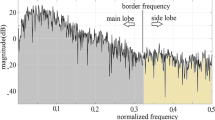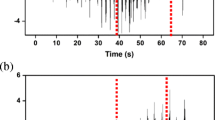Abstract
Surface electromyography (sEMG) is a common technique used in the assessment of local muscle fatigue. As opposed to static contraction situations, sEMG recordings during dynamic contractions are particularly characterised by non-stationary (and non-linear) features. Standard signal processing methods using Fourier and wavelet based procedures demonstrate well known restrictions on time–frequency resolution and the ability to process non-stationary and/or non-linear time-series, thus aggravating the spectral parameters estimation. The Hilbert–Huang transform (HHT), comprising of the empirical mode decomposition (EMD) and Hilbert spectral analysis (HSA), provides a new approach to overcome these issues. The time-dependent median frequency estimate is used as muscle fatigue indicator, and linear regression parameters are derived as fatigue quantifiers. The HHT method is utilised for the analysis of the sEMG signals recorded over quadriceps muscles during cyclic dynamic contractions. The results are compared with those obtained by the Fourier and wavelet based methods. It is shown that HHT procedure provides the most consistent and reliable assessment of spectral and derived linear regression parameters, given the time epoch width and sampling interval in the time domain. The suggested procedure successfully deals with non-stationary and non-linear properties of biomedical signals.






Similar content being viewed by others
References
Beck TW, Housh TJ, Johnson GO, Weir JP, Cramer JT, Coburn JW, Malek WH (2005) Comparison of Fourier and wavelet transform procedures for examining the mechanomyographic and electromyographic frequency domain responses during fatiguing isokinetic muscle actions of the biceps brachii. J Electromyogr Kinesiol 15:190–199
Cifrek M (1997) Myoelectric signal analysis during dynamic fatigue. Ph.D. Dissertation. University of Zagreb, Faculty of Electrical Engineering and Computing [in Croatian]
Cifrek M, Tonkovic S, Medved V (1998) Surface myoelectric signal spectral analysis during fatigued dynamic contractions of quadriceps muscle. In: Magjarevic R (ed) 8th international IMEKO conference on measurement in clinical medicine. KoREMA, Zagreb, pp 98–101
Cifrek M, Tonkovic S, Medved V (2000) Measurement and analysis of surface myoelectric signals during fatigued cyclic dynamic contractions. Measurement 27(2):85–92
Cifrek M, Medved V, Tonkovic S, Ostojic S (2009) Surface EMG based muscle fatigue evaluation in biomechanics. Clin Biomech 24:327–340
Cohen L (1995) Time–frequency analysis. Prentice-Hall, Englewood Cliffs, NJ
Coorevits P, Danneels L, Cambier D, Ramon H, Druyts H, Karlsson JS, De Moor G, Vanderstraeten G (2008) Correlations between short-time Fourier and continuous wavelet transforms in the analysis of localized back and hip muscle fatigue during isometric contractions. J Electromyogr Kinesiol 18:637–644
De Luca CJ (1984) Myoelectrical manifestations of localized muscular fatigue in humans. Crit Rev Biomed Eng 11(4):251–279
De Luca CJ (1992) Spectral compression of the EMG signal as an index of muscle fatigue. In: Sargeant AJ, Kernel D (eds) Neuromuscular fatigue. Royal Netherlands Academy of Arts and Sciences, Amsterdam, The Netherlands, pp 44–51
Echeverria JC, Crowe JA, Woolfson MS, Hayes-Gill BR (2001) Application of empirical mode decomposition to heart rate variability analysis. Med Biol Eng Comput 39(4):471–479
Farina D, Merletti R, Nazzaro M, Caruso I (2001) Effect of joint angle on EMG variables in leg and thigh muscles. IEEE Eng Med Biol Mag 20(6):62–71
Flandrin P, Rilling G, Gonçalves P (2004) Empirical mode decomposition as a filter bank. IEEE Signal Process Lett 11(2):112–114
Flandrin P, Auger F, Gonçalves P, Lemoine O (2005) The Time–Frequency Toolbox (For Use with MATLAB). http://tftb.nongnu.org. Accessed 15 Oct 2010
Gianfelici F, Biagetti G, Crippa P, Turchetti C (2007) Multicomponent AM–FM representations: an asymptotically exact approach. IEEE Trans Audio Speech Lang Processing 15(3):823–837
Hof L (1991) Errors in frequency parameters of EMG power spectra. IEEE Trans Biomed Eng 38(11):1077–1088
Huang NE (2005) The Hilbert–Huang transform in engineering. Taylor & Francis, New York
Huang NE, Shen Z, Long SR, Wu MLC, Shih HH, Zheng QN, Yen NC, Tung CC, Liu HH (1998) The empirical mode decomposition and the Hilbert spectrum for nonlinear and non-stationary time series analysis. Proc R Soc Lond A 454(1971):903–995
Huang W, Shen Z, Huang NE, Fung YC (1998) Engineering analysis of biological variables: an example of blood pressure over 1 day. Proc Natl Acad Sci USA 95(9):4816–4821
Karlsson S, Yu J, Akay M (1999) Enhancement of spectral analysis of myoelectric signals during static contractions using wavelet methods. IEEE Trans Biomed Eng 46(6):670–684
Karlsson S, Yu J, Akay M (2000) Time–frequency analysis of myoelectric signals during dynamic contractions: a comparative study. IEEE Trans Biomed Eng 47(2):228–238
Karlsson JS, Gerdle B, Akay M (2001) Analyzing surface myoelectric signals recorded during isokinetic contractions. IEEE Eng Med Biol Mag 20(6):97–105
Knaflitz M, Bonato P (1999) Time–frequency methods applied to muscle fatigue assessment during dynamic contractions. J Electromyogr Kinesiol 9(5):337–350
Li M, Gu X-K, Yang S-S (2008) Hilbert–Huang transform based time–frequency distribution and comparisons with other three. In: Li Q, Chen SY, Xu A, Li M (eds) Proceedings of the 7th WSEAS international conference on instrumentation, measurement, circuits and systems, World Scientific and Engineering Academy and Society (WSEAS), Hangzhou, China, pp 66–71
Lindström L (1973) On the frequency spectrum of EMG signals. Research Laboratory of Medical Electronics, Chalmers University of Technology, Göteborg
MacIsaac DT, Parker PA, Scott RN, Englehart KB, Duffley C (2001) Influences of dynamic factors on myoelectric parameters. IEEE Eng Med Biol Mag 20(6):82–89
Mallat S (1999) A wavelet tour of signal processing, 2nd edn. Academic Press, San Diego, CA
Merletti R, Lo Conte LR (1995) Advances in processing of surface myoelectric signals: part 1. Med Biol Eng Comput 33(3):362–372 Spec No
Merletti R, Parker P (2004) Electromyography–physiology, engineering and noninvasive applications, 1st edn. Wiley, Hoboken, New Jersey
Oppenheim AV, Shafer RW (1989) Discrete-time signal processing. Prentice-Hall, Inc., Englewood Cliffs, New Jersey
Peng B, Jin X, Min Y, Su X (2006) The study on the sEMG signal characteristics of muscular fatigue based on the Hilbert–Huang transform. In: Computational science—ICCS 2006, proceedings, vol 3991(Pt 1), pp 140–147
Rilling G, Flandrin P, Gonçalves P (2003) On empirical mode decomposition and its algorithms. In: IEEE-EURASIP workshop on nonlinear signal and image processing NSIP-03, Grado (I)
Roy SH, De Luca CJ, Schneider J (1986) Effects of electrode location on myoelectric conduction velocity and median frequency estimates. J Appl Physiol 61:1510–1517
Ryan ED, Cramer JT, Egan AD, Hartman MJ, Herda TJ (2008) Time and frequency domain responses of the mechanomyogram and electromyogram during isometric ramp contractions: a comparison of the short-time Fourier and continuous wavelet transforms. J Electromyogr Kinesiol 18:54–67
Signorile JF, Kacsik D, Perry A, Robertson B, Williams R, Lowensteyn I, Digel S, Caruso J, LeBlanc WG (1995) The effect of knee and foot position on the electromyographical activity of the superficial quadriceps. J Orthop Sports Phys Ther 22(1):2–9
Stulen FB, De Luca CJ (1981) Frequency parameters of the myoelectric signal as a measure of muscle conduction-velocity. IEEE Trans Biomed Eng 28(7):515–523
Winter DA, Fuglevand AJ, Archer SE (1994) Crosstalk in surface electromyography: theoretical and practical estimates. J Electromyogr Kinesiol 4(1):15–26
Wu Z, Huang NE (2004) A study of the characteristics of white noise using the empirical mode decomposition method. Proc R Soc Lond A460:1597–1611
Xie HB, Wang ZZ (2006) Mean frequency derived via Hilbert–Huang transform with application to fatigue EMG signal analysis. Comput Methods Programs Biomed 82(2):114–120
Author information
Authors and Affiliations
Corresponding author
Rights and permissions
About this article
Cite this article
Srhoj-Egekher, V., Cifrek, M. & Medved, V. The application of Hilbert–Huang transform in the analysis of muscle fatigue during cyclic dynamic contractions. Med Biol Eng Comput 49, 659–669 (2011). https://doi.org/10.1007/s11517-010-0718-7
Received:
Accepted:
Published:
Issue Date:
DOI: https://doi.org/10.1007/s11517-010-0718-7




